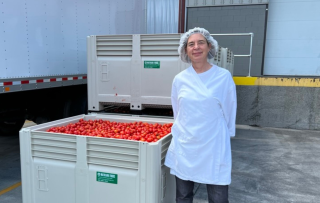This past October, and for the tenth year in a row, Food Inspiration attended the Google Food Lab – Google's think tank on the future of our food system – in Los Angeles. The event hosted a cross section of changemakers from the food sector to discuss the important systemic challenges of our time. A panel discussion with four international start-ups and scale-ups yielded twelve lessons for starting food entrepreneurs.
Where do you find the courage to leave your comfort zone? When do you dare to take the leap of faith and endeavor into the unknown? The four entrepreneurs were Deniz Kent of Prolific Machines, Markus Stipf of Spoon Guru, Nell Ward of Grow It Yourself and Ruud Zanders of Kipster Farms. Their top twelve tips for success include:
-
Overcome the fear of failure. It's the fear that keeps you from taking a risk, from doing something you haven’t done before.
-
Talk to people who are outside of your own bubble. Step out of your echo chamber with like-minded people. Other opinions make you smarter. Speak to your detractors and seek first to understand, then to be understood.
-
It’s okay to be naive. If these entrepreneurs had known everything beforehand, they might not have even started a company. Launching your own company is not choosing the easiest path, but is an extremely fascinating and educational journey.
-
Find the right partners. Partners who understand you, appreciate your intentions and actually want to support you.
-
It’s fine if you seek to solve a personal frustration with your start-up business. Many new business ideas start out of personal frustration. One of the entrepreneurs from the panel started a business in cultured meat simply because he likes eating meat, but hates that this involves killing animals on an industrial scale.
-
Try to look at risk in a different light. Choose a wider and further perspective. Recall management guru Stephen Covey and his book ‘The Seven Habits of Highly Effective People’. Imagine yourself witnessing your own funeral. What do you wish you had done with your time on Earth? What do you want people to say about you? If you could write your own obituary, what would you like to say about the things you have done? Zooming out this way can remove some of the fear of risk.
-
It’s wise to pursue something you are truly passionate about, and that you are really good at. The personal investment – time, effort, mental space – that starting a business requires must be fueled by ardent desire and some talent.
-
Be humble and ask for help. Don’t let your pride get in the way of asking for advice. As soon as you think you are omniscient, an alarm bell should sound: the Icarus effect is lurking. If belief in your own formidable personality takes you to higher realms, someone needs to put you back on the ground. If this doesn’t happen, you will become unreachable as a leader and you might crash, just like mythical Icarus did when he flew too close to the sun and the wax in his wings melted.
-
Surround yourself with people who inspire you. Avoid negativity and look for people with an entrepreneurial spirit who look for solutions to challenges.
-
The status quo is not acceptable for a starting entrepreneur, but enabling change is taking one step forward at a time. Don’t be discouraged if the dot on the horizon barely seems to get closer; every step you take is one towards your goal.
-
To be inert – slow, passive, not interacting with the outside world – is the enemy of progress.
-
It’s better to achieve 90% of a bold goal than 110% of a goal without ambition. Taking the long view, with a courageous goal at the center, can help us all go further.
 Written by
Written by 






























